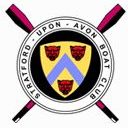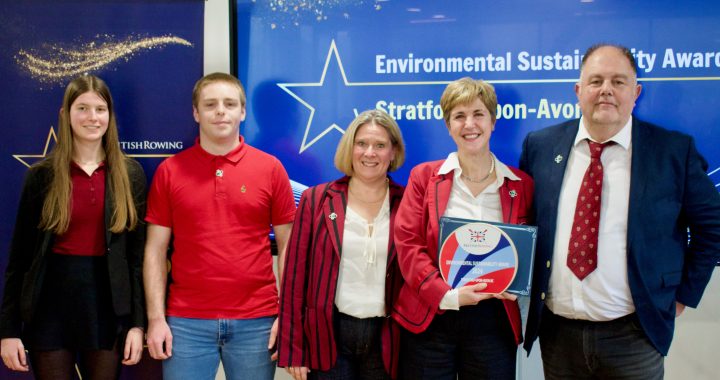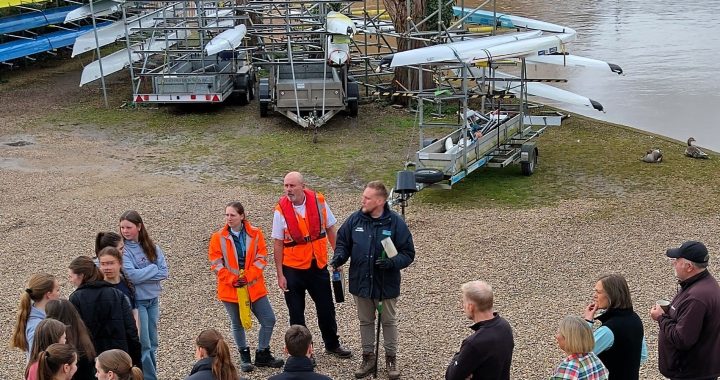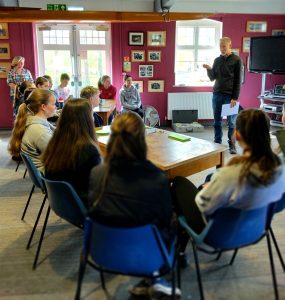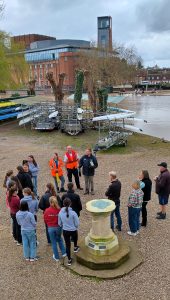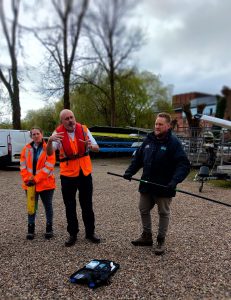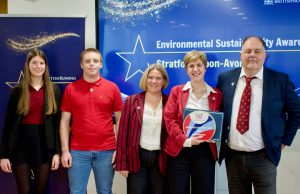 Stratford upon Avon Boat Club has been awarded the inaugural Environmental Sustainability Award at the prestigious British Rowing Awards 2024 held at the River & Rowing Museum at Henley on Thames. The recognition highlights the Club’s dedication to making environmental strides despite limited resources.
Stratford upon Avon Boat Club has been awarded the inaugural Environmental Sustainability Award at the prestigious British Rowing Awards 2024 held at the River & Rowing Museum at Henley on Thames. The recognition highlights the Club’s dedication to making environmental strides despite limited resources.
Stratford Boat Club, with its thriving junior, adaptive, and growing masters’ sections, has emerged as a winner in sustainability in taking proactive steps to reduce its environmental footprint. Like many volunteer-led grassroots sports clubs, Stratford Boat Club faces the daily challenge of managing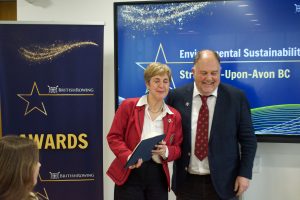 operations, funding necessary repairs and equipment which can make it difficult to prioritise environmental action. Nonetheless, the Club’s management committee agreed to establish a Sustainability Working Group in February 2024. With no budget, the initiative grew organically, developed by a cross-section of committee and ordinary members who shared a passion for their Club and the environment.
operations, funding necessary repairs and equipment which can make it difficult to prioritise environmental action. Nonetheless, the Club’s management committee agreed to establish a Sustainability Working Group in February 2024. With no budget, the initiative grew organically, developed by a cross-section of committee and ordinary members who shared a passion for their Club and the environment.
A survey of the Club’s members indicated strong concern about climate change and its impact on the River Avon, the wider environment and their sport. Informal conversations around environmental action led to a  discussion on cleaning products. A quick win was identified on washing up liquid which is harmful to aquatic life. All sections were consulted and the decision taken to use only water to clean boats and an eco-friendly product in the kitchen.
discussion on cleaning products. A quick win was identified on washing up liquid which is harmful to aquatic life. All sections were consulted and the decision taken to use only water to clean boats and an eco-friendly product in the kitchen.
To give a voice to the Club’s junior section, a workshop was organised in the Easter holidays to enable the juniors to brainstorm ideas for more sustainable Club practices and make space for nature. A British Rowing representative spoke about using communications to create dialogue with members and the wider community on the environment and to build momentum for change. Severn Trent River Rangers conducted ammonia testing and shared insights into their work to improve river health.
Suggestions to reduce the Club’s regatta’s carbon footprint included encouraging lift shares, not purchasing single use plastic, sourcing local and homemade food, choosing to support local businesses, separating food waste collection, improving signage around waste and recycling, choosing recycled glass for prizes and selling reusable cups.
One participant reflected, “The workshop helped to explain how things can’t just happen straight away. Even though we may be a small club, just doing our bit for the river or local environment, even though it may seem as if it has little impact, it does add up to something bigger when a lot of places do similar things.” A ‘bee café’ at the Club entrance now greets visitors to highlight the importance of pollinators. Guidance was sought from local “gardening for wildlife” designer Lucy Hartley and plants were donated from members gardens.
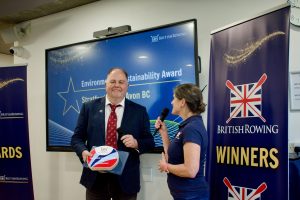 The Club’s collaborative approach allows members to contribute to the development of comprehensive environmental and communications action plan. Projects that align with Club priorities – and have environmental co-benefits – opens up new avenues for funding and partnerships. “Winning the British Rowing Environmental Sustainability Award is a testament to the passion of our members and the positive impact that can result from small, intentional actions,” said Dawson Curnock, Chairman of Stratford upon Avon Boat Club. “Taking the lead in sustainability not only aligns with our Club’s values but also strengthens our reputation as an inclusive and progressive organisation. By allowing members to lead on these initiatives, we’ve created meaningful change without incurring additional financial costs.”
The Club’s collaborative approach allows members to contribute to the development of comprehensive environmental and communications action plan. Projects that align with Club priorities – and have environmental co-benefits – opens up new avenues for funding and partnerships. “Winning the British Rowing Environmental Sustainability Award is a testament to the passion of our members and the positive impact that can result from small, intentional actions,” said Dawson Curnock, Chairman of Stratford upon Avon Boat Club. “Taking the lead in sustainability not only aligns with our Club’s values but also strengthens our reputation as an inclusive and progressive organisation. By allowing members to lead on these initiatives, we’ve created meaningful change without incurring additional financial costs.”
A second hand kit sale and “Club clean-up” timed with the Great British Spring Clean will kick off 2025. Claudine Pearson, Sustainability Lead for Stratford Boat Club says, “We are looking forward to using our prize from Delphis at the Club Clean-Up Day. Delphis’ cleaning products are professional award-winning, ecological cleaning products, made from renewable, plant-based ingredients that aim to significantly reduce both plastic waste, water pollution and carbon emissions. We can all reduce the number of harmful chemicals being poured down the drain and into the natural environment. This award highlights how a small club like Stratford can punch above its weight by adopting sustainable practices and serves as a model for other grassroots sports clubs looking to make a positive impact on the environment.”
Sport England’s club support website, Buddle, has interviewed Stratford for a case study on its environmental strategy and action plan.
For media coverage, see Stratford Observer https://www.stratfordobserver.co.uk/news/stratford-boat-club-scoops-sustainability-award and British Rowing https://www.britishrowing.org/2025/02/british-rowing-award-winners-recognised-at-celebration-lunch
For pictures of the award ceremony, see https://drive.google.com/drive/folders/1f3YGelfzZ9wBhEzqku7ju-eiXp8c0cuP
